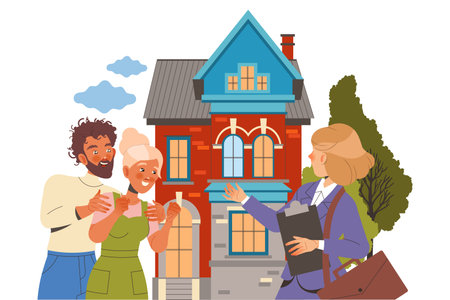1. What Is Your Experience in My Neighborhood?
When youre getting ready to list your home, its important to choose a real estate agent who knows your local area inside and out. Asking about their experience in your specific neighborhood helps you understand how well they know the local market, pricing trends, and what buyers are currently looking for in homes like yours.
An agent with solid experience in your community will likely have insights into:
- The average days on market for similar homes
- Recent sale prices of comparable properties
- What features buyers prioritize in your area
- Local schools, amenities, and lifestyle factors that attract buyers
If an agent has listed or sold homes near yours recently, that’s a good sign they’ll know how to position your home competitively. They’ll also be better equipped to price it right from the start — which can lead to a faster sale and potentially higher offers.
Key Questions to Ask About Local Experience
| Question | Why It Matters |
|---|---|
| How many homes have you sold in my neighborhood? | This shows their familiarity with recent sales activity and buyer expectations in your area. |
| Do you currently have any listings nearby? | If they’re actively working in the neighborhood, they’re more likely up-to-date on current market conditions. |
| Can you provide examples of similar homes youve sold? | This helps you compare how your home stacks up against others and see what marketing strategies were successful. |
A strong local track record means the agent is more likely to set realistic expectations, market your home effectively, and connect with qualified buyers. So don’t hesitate to ask for specifics — it’s one of the best ways to make sure you’re choosing the right person to sell your home.
2. What Is Your Marketing Strategy for My Home?
When youre preparing to list your home, one of the most important things to ask your real estate agent is how they plan to market your property. A strong marketing strategy can make a big difference in how quickly your home sells and the price you get for it. Make sure to understand what tools and tactics the agent will use to attract potential buyers.
Why Marketing Matters
Simply putting a “For Sale” sign in the yard isnt enough anymore. Todays buyers search online, scroll through social media, and expect high-quality photos and video tours. Thats why its crucial to work with an agent who uses modern marketing techniques to give your home maximum exposure.
Key Elements of a Good Marketing Plan
Ask your agent if they will include the following in their marketing strategy:
| Marketing Tool | Description |
|---|---|
| Online Listings | Your home should be listed on major real estate websites like Zillow, Realtor.com, Redfin, and the MLS. |
| Professional Photography | High-quality images help your home stand out online and attract more interest. |
| Virtual Tours & Videos | Buyers love being able to tour a home from their phone or computer. Ask if video walkthroughs or 3D tours are included. |
| Social Media Advertising | Platforms like Facebook and Instagram are great places to reach local buyers. Find out if your agent runs paid ads or creates shareable posts. |
| Open Houses | Traditional open houses can still draw interested buyers. Ask how often these will be scheduled. |
| Email Campaigns | An experienced agent may have a list of buyers and other agents they can email directly about your listing. |
Questions You Can Ask Your Agent
- Which websites will my home be listed on?
- Do you hire a professional photographer?
- Will you create a virtual tour or video walkthrough?
- How do you use social media to market homes?
- Do you host open houses, and how often?
- What kind of print materials (flyers, brochures) will you provide?
- Can I see examples of marketing youve done for past listings?
A Quick Tip:
If an agent hesitates or gives vague answers when asked about their marketing plan, that could be a red flag. A confident and organized agent should be able to walk you through their entire strategy step-by-step.

3. How Should I Prepare My Home to Maximize Its Value?
One of the most important questions to ask your real estate agent before listing your home is how to best prepare it for the market. A well-prepped home not only attracts more buyers but can also help you secure a higher sale price. Your agent should be able to give you specific recommendations based on current market trends and buyer expectations in your area.
Ask for Tailored Improvement Suggestions
Not all upgrades are worth the investment, so its essential to focus on changes that offer the highest return. Ask your agent which improvements will make the biggest impact in your local market. These could range from simple cosmetic fixes to more significant updates.
| Area of Focus | Suggested Improvements |
|---|---|
| Curb Appeal | Mow the lawn, trim bushes, paint the front door, add potted plants |
| Kitchen | Update hardware, install new lighting, repaint cabinets, replace outdated appliances if needed |
| Bathrooms | Re-caulk tubs, replace old fixtures, add fresh towels and decor |
| Walls & Paint | Use neutral colors to appeal to a wider audience |
| Flooring | Deep clean carpets or consider replacing worn flooring with cost-effective options like laminate or vinyl plank |
Staging Tips That Make a Difference
Your agent may suggest staging your home to help potential buyers visualize living there. This doesn’t always require renting furniture; sometimes rearranging or removing existing furniture can open up space and improve flow.
- Declutter and depersonalize—remove family photos and excess items
- Create inviting spaces—set the dining table or add cozy touches to bedrooms
- Add strategic lighting—use lamps and open blinds to brighten rooms
The Power of a Pre-Listing Inspection
Your agent might recommend a pre-listing inspection to identify any repair issues ahead of time. Fixing small problems before listing can prevent surprises during the buyer’s inspection and keep negotiations smoother.
Questions to Ask Your Agent:
- “Which updates will give me the best return on investment in this neighborhood?”
- “Do you recommend professional staging or can we do it ourselves?”
- “Are there any low-cost changes that could really make my home stand out?”
A knowledgeable real estate agent will guide you through these decisions and help you prioritize what matters most based on your budget and timeline.
4. What Pricing Strategy Do You Recommend?
One of the most important things to ask your real estate agent before listing your home is how they plan to price it. A smart pricing strategy can help you sell faster and for more money. Your agent should be able to explain their approach clearly and back it up with data.
Understanding How the Price Is Set
Your agent should base the listing price on a few key factors:
- Comparative Market Analysis (CMA): This report looks at similar homes in your neighborhood that have recently sold, are currently on the market, or were listed but didn’t sell. It helps set a realistic price range.
- Current Market Trends: Is it a buyer’s market or a seller’s market? Are homes selling quickly or sitting on the market? These trends influence how aggressively you should price.
- Your Timeline: If you need to move quickly, your agent might suggest a more competitive price to attract buyers fast. If you have time, you might price higher and wait for the right offer.
Ask About Different Pricing Strategies
A good agent will walk you through different pricing options. Here’s a quick comparison of common strategies:
| Strategy | Description | Best For |
|---|---|---|
| Market Value Pricing | Lists your home based on recent sales of similar properties. | Sellers who want a balance between speed and profit. |
| Aggressive Pricing | Slightly underprices the home to generate multiple offers quickly. | Sellers needing a fast sale or looking to spark bidding wars. |
| Aspirational Pricing | Lists the home above market value hoping for a high offer. | Sellers not in a rush who want to test the market. |
Pro Tip:
If your agent suggests pricing too high without solid data, that could be a red flag. Overpricing can lead to fewer showings and longer time on the market—sometimes ending in a lower final sale price after reductions.
The Bottom Line
Your agent should tailor the pricing strategy to your goals, timeline, and local market conditions. Be sure they walk you through their process so you feel confident in where your home is priced before hitting the market.
5. What Are Your Fees and Contract Terms?
Before you sign anything, its essential to understand exactly what youre agreeing to when listing your home with a real estate agent. Asking about fees and contract terms upfront can save you from unexpected costs or complications later on.
Understand the Commission Structure
Most real estate agents work on commission, which is typically a percentage of the final sale price of your home. This is usually split between your listing agent and the buyer’s agent. Knowing this number ahead of time helps you calculate how much youll actually walk away with after closing.
Typical Real Estate Commission Breakdown
| Commission Type | Percentage |
|---|---|
| Total Commission | 5% – 6% |
| Listing Agent’s Share | 2.5% – 3% |
| Buyer’s Agent’s Share | 2.5% – 3% |
Ask About Additional Fees
While the commission is the most significant cost, there may be other fees involved in listing your home. These could include:
- Marketing or advertising fees
- Photography or virtual tour costs
- Staging expenses
Some agents cover these costs themselves as part of their service, while others may charge them separately—so it’s important to ask for clarification.
Review the Listing Agreement Length
The listing agreement defines how long your agent will represent your home on the market. Most agreements range from 90 to 180 days. If your home doesnt sell during that time, you’ll need to decide whether to renew the agreement or go with another agent.
Common Listing Agreement Durations
| Term Length | Description |
|---|---|
| 90 Days | Short-term commitment; good if youre unsure about the agent |
| 120 Days | A moderate timeframe commonly used in balanced markets |
| 180 Days | Longer term; useful in slower markets or for high-end homes |
Cancellation Policy Matters Too
You should also ask what happens if you want to cancel the agreement early. Some agents allow cancellation without penalty, while others may charge a fee or have specific conditions. Make sure everything is clearly outlined in writing so you’re not caught off guard later.


